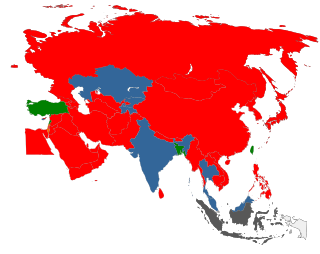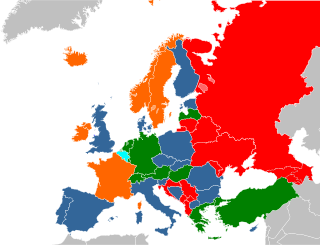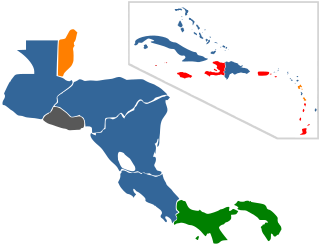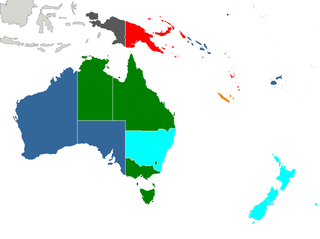Related Research Articles

Street prostitution is a form of prostitution in which a prostitute solicits customers from a public place, most commonly a street, while waiting at street corners or walking alongside a street, but also other public places such as parks, benches, etc. The street prostitute is often dressed in a provocative manner. The sex act may be performed in the customer's car, in a nearby secluded street location, or at the prostitute's residence or in a rented motel room.
The Crown Dependencies are three offshore island territories in the British Islands that are self-governing possessions of the British Crown: the Bailiwick of Guernsey and the Bailiwick of Jersey, both located in the English Channel and together known as the Channel Islands, and the Isle of Man in the Irish Sea between Great Britain and Ireland.
Sexual Offences Act is a stock short title used for legislation in the United Kingdom and former British colonies and territories such as Antigua and Barbuda, Crown dependencies, Kenya, Lesotho, Republic of Ireland, Sierra Leone, South Africa and Trinidad and Tobago relating to sexual offences.
The standard scale is a system in Commonwealth law whereby financial criminal penalties (fines) in legislation have maximum levels set against a standard scale. Then, when inflation makes it necessary to increase the levels of the fines the legislators need to modify only the scale rather than every individual piece of legislation.

In Great Britain, the act of engaging in sex as part of an exchange of various sexual services for money is legal, but a number of related activities, including soliciting in a public place, kerb crawling, owning or managing a brothel, pimping and pandering, are illegal. In Northern Ireland, which previously had similar laws, paying for sex became illegal from 1 June 2015.

The legality of prostitution in Asia varies by country. There is often a significant difference in Asia between prostitution laws and the practice of prostitution. In 2011, the Asian Commission on AIDS estimated there were 10 million sex workers in Asia and 75 million male customers.

Prostitution is illegal in the vast majority of the United States as a result of state laws rather than federal laws. It is, however, legal in some rural counties within the state of Nevada. Additionally, it is decriminalized to sell sex in the state of Maine, but illegal to buy sex. Prostitution nevertheless occurs elsewhere in the country.

Prostitution in Australia is governed by state and territory laws, which vary considerably, although none ban the selling of sex itself.
Prostitution in Belize is legal, but the buying of sexual services is not. Associated activities such as operating a brothel, loitering for the purposes of prostitution and soliciting sex are also illegal.

Prostitution is legal and regulated in Bangladesh. Prostitutes must register and state an affidavit stating that they are entering prostitution of their own free choice and that they are unable to find any other work. Bangladeshi prostitutes often suffer poor social conditions and are frequently socially degraded.
Prostitution is not illegal in Sri Lanka, however, related activities such as soliciting, procuring, and brothels are outlawed. It is also illegal to traffic persons for prostitution, especially minors. Prostitution is not as widespread in Sri Lanka as in some neighbouring countries. It is estimated that there are 40,000 prostitutes in the country, and nearly half of them operate in Colombo.
Prostitution in Trinidad and Tobago is legal but related activities such as brothel keeping, soliciting and pimping are illegal.

The legality of prostitution in Europe varies by country.
Prostitution in Namibia is legal and a highly prevalent common practice. Related activities such as solicitation, procuring and being involved in the running of a brothel are illegal. A World Bank study estimated there were about 11,000 prostitutes in Namibia.

Lesbian, gay, bisexual, and transgender (LGBT) rights in the British Crown dependency of Guernsey have improved significantly in the past decades. Same-sex sexual activity for both men and women is legal in Guernsey. Same-sex marriage has been legal since 2 May 2017 in Guernsey, and since 14 June 2018 in its dependency, Alderney. Legislation approving the legalisation of same-sex marriage in its other dependency, Sark was given royal assent on 11 March 2020. Guernsey is the only part of the British Isles to have never enacted civil partnership legislation, though civil partnerships performed in the United Kingdom were recognised for succession purposes. Since April 2017, same-sex couples can adopt in the entire Bailiwick. Discrimination based on sexual orientation and gender identity has been banned since 2004. Transgender people have been able to legally change gender since 2007.
Prostitution in Hawaii is illegal but common. There are about 150 brothels in Oahu alone.

Legality of prostitution in the Americas varies by country. Most countries only legalized prostitution, with the act of exchanging money for sexual services legal. The level of enforcement varies by country. One country, the United States, is unique as legality of prostitution is not the responsibility of the federal government, but rather state, territorial, and federal district's responsibility.

Prostitution in Oceania varies greatly across the region. In American Samoa, for instance, prostitution is illegal, whereas in New Zealand most aspects of the trade are decriminalised.
The British Overseas Territories (BOT) or alternatively, United Kingdom Overseas Territories (UKOTs), are 14 territories under the jurisdiction and sovereignty of the United Kingdom. They are the parts of the British Empire that have not been granted independence or have voted to remain British territories. These territories do not form part of the United Kingdom. Most of the inhabited territories are internally self-governing, with the UK retaining responsibility for defence and foreign relations. The rest are either uninhabited or have a transitory population of military or scientific personnel.

The history of prostitution in France has similarities with the history of prostitution in other countries in Europe, namely a succession of periods of tolerance and repression, but with certain distinct features such as a relatively long period of tolerance of brothels.
References
- ↑ "Crown Dependencies - Justice Committee". Parliament of the United Kingdom . 30 March 2010. Retrieved 14 November 2016.
- ↑ "Background briefing on the Crown dependencies: Jersey, Guernsey and the Isle of Man" (PDF). Ministry of Justice . Retrieved 31 July 2017.
- ↑ "Fact sheet on the UK's relationship with the Crown Dependencies" (PDF). Ministry of Justice. Retrieved 25 August 2014.
- ↑ "The Summary Offences (Bailiwick of Guernsey) Law, 1982". Guernsey Legal Resources. Retrieved 19 February 2018.
- ↑ "Ordonnance relative aux Maisons de Prostitution et aux Prostituées - [1906]". Guernsey Legal Resources. Retrieved 19 February 2018.
- 1 2 3 McLellan, Jon (February 2013). "The strange case of the maladies secrètes ordinance of 1912". Jersey Law. Retrieved 19 February 2018.
- ↑ "'Vice ring' targeting local pubs and clubs". Guernsey Press. 8 October 2005. Retrieved 19 February 2018.
- 1 2 "Jersey hotels warned of the signs of prostitution". ITV News. 5 February 2015. Retrieved 19 February 2018.
- ↑ "Prostitution laws 'could be updated'". BBC News. 19 May 2015. Retrieved 19 February 2018.
- 1 2 "Fall in number of prostitutes advertising in Jersey". Jersey Evening Post. 6 February 2015. Retrieved 19 February 2018.
- ↑ "Sexual Offences Draft Law". Information and public services for the Island of Jersey. Retrieved 19 February 2018.
- ↑ "Consultation draft - Sexual Offences (Jersey) Act" (PDF). Information and public services for the Island of Jersey. Retrieved 19 February 2018.
- 1 2 3 4 "Red Lamps Shining Through the Fog – Gallery Magazine Jersey". Gallery. 26 January 2010. Retrieved 19 February 2018.
- ↑ "Sexual Offences Act 1992" (PDF). Isle of Man Legislation. Retrieved 19 February 2018.
- ↑ "Isle of Man Escorts, IOM Escorts". Select An Escort Directory. Retrieved 19 February 2018.
- ↑ "Pair arrested over prostitution offences | Isle of Man News :: isleofman.com". IsleOfMan.com. 3 September 2013. Retrieved 19 February 2018.